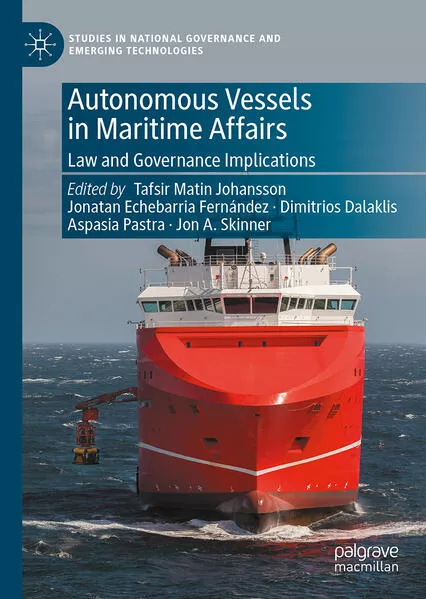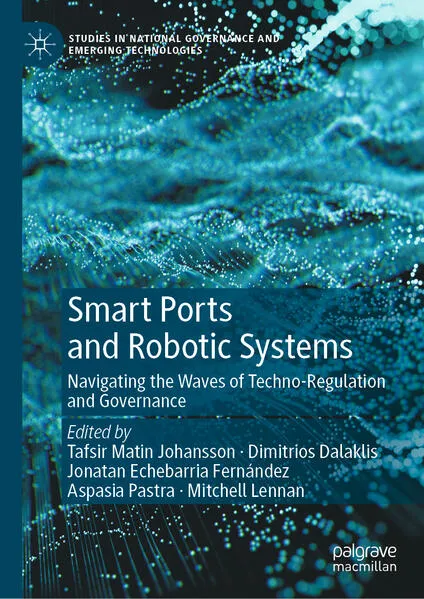Studies in National Governance and Emerging Technologies
Open Data Governance and Its Actors
Chronologie aller Bände (1 - 4)
Die Reihenfolge beginnt mit dem Buch "Open Data Governance and Its Actors". Wer alle Bücher der Reihe nach lesen möchte, sollte mit diesem Band von Maxat Kassen beginnen. Der zweite Teil der Reihe "Autonomous Vessels in Maritime Affairs" ist am 06.04.2023 erschienen. Mit insgesamt 4 Bänden wurde die Reihe über einen Zeitraum von ungefähr 3 Jahren fortgesetzt. Der neueste Band trägt den Titel "Digitalisation and Public Policy in Africa".
- Anzahl der Bewertungen für die gesamte Reihe: 0
- Ø Bewertung der Reihe: 0
- Start der Reihe: 29.01.2022
- Neueste Folge: 07.02.2025
Diese Reihenfolge enthält 3 unterschiedliche Autoren.
- Autor: Kassen, Maxat
- Anzahl Bewertungen: 0
- Ø Bewertung:
- Medium: Buch
- Veröffentlicht: 29.01.2022
- Genre: Politik
Open Data Governance and Its Actors
This book combines theoretical and practical knowledge about key actors and driving forces that help to initiate and advance open data governance. Using Finland and Sweden as case studies, it sheds light on the roles of key actors in the open data movement, enabling researchers to understand the key operational elements of data-driven governance. Examining the most salient manifestations of related networking activities, the motivations of stakeholders, and the political and socioeconomic readiness of the public, private and civic sectors to advance such policies, it will appeal to e-government experts, policymakers and political scientists, as well as academics and students of public administration, public policy, and open data governance.
- Autor: Johansson, Tafsir Matin
- Anzahl Bewertungen: 0
- Ø Bewertung:
- Medium: Buch
- Veröffentlicht: 06.04.2023
- Genre: Politik
Autonomous Vessels in Maritime Affairs
This book examines law and governance implications in relation to maritime autonomous surface ships (MASS). Adopting a multi-disciplinary approach, it focuses on a wide array of timely, topical and thorny issues, including naval warfare and security, seaworthiness and techno-regulatory assessments, global environmental change, autonomous passenger transportation, as well as liability and insurance. It also considers selected national and regional developments. The book provides an insight into the role of innovation-diplomacy as the driving force that could expedite the transition from automation to autonomy. After navigating through the complex law and governance landscape, it concludes by assessing critical findings for further consideration. The book will appeal to scholars and students of maritime technology, law and governance.
Chapter 11 and Chapter 18 are available open access under a Creative Commons Attribution 4.0 International License via link.springer.com.
- Autor: Johansson, Tafsir Matin
- Anzahl Bewertungen: 0
- Ø Bewertung:
- Medium: Buch
- Veröffentlicht: 13.06.2023
- Genre: Politik
Smart Ports and Robotic Systems
This book provides a comprehensive overview of smart ports and remote technologies in the maritime industry. It demonstrates how modern advances in artificial intelligence and robotics have transformed the shipping industry, and assesses the impact of this technology from a law and governance standpoint. The book covers a range of topics including port autonomous operations systems, cybersecurity, big data analytics, digitalization and blockchain to throw light on the opportunities and benefits of these new technologies in improving security and safety. It also considers the challenges and threats of their application. It concludes by examining the trajectory of national and international regulatory developments. The book will appeal to scholars and students of maritime technology, law and governance, as well as practitioners and policymakers.
Chapters 8, 19 and 20 are available open access under a Creative Commons Attribution 4.0 International License via link.springer.com.
- Autor: Onyango, Gedion
- Anzahl Bewertungen: 0
- Ø Bewertung:
- Medium: Buch
- Veröffentlicht: 07.02.2025
- Genre: Politik
Digitalisation and Public Policy in Africa
This book examines the ways in which government-owned technologies (GovTechs) and technologies owned by civil society organisations (CivicTechs) can be integrated into policy processes to enhance interactions between citizens and governments, and ensure effective, efficient, and accountable public service delivery. It takes stock of current technological innovations, and assesses the ways in which they can be aligned with GovTechs and CivicTechs to improve African governments' capacities in public policy and governance processes.
The first part of the book traces the emergence of digital technologies in public administration, and assesses their benefits and challenges, especially in the Global South. The following chapters present case studies from across Africa and various policy sectors to show how GovTechs and CivicTechs operate. They demonstrate how digital platforms can be used to protect data, enhance democracy, improve food systems, and reduce corruption.
The book will appeal to all those interested in public policy, public administration, emerging technologies, and African politics.



